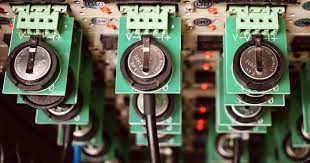
Breaking News
 The Domino Effect: How a U.S. Attack on Iran Could Unleash Global Catastrophe
The Domino Effect: How a U.S. Attack on Iran Could Unleash Global Catastrophe
 The True History of Glyphosate, Derived from Deadly Organophosphate Nerve Agents like Sarin...
The True History of Glyphosate, Derived from Deadly Organophosphate Nerve Agents like Sarin...
Top Tech News
 New Spray-on Powder Instantly Seals Life-Threatening Wounds in Battle or During Disasters
New Spray-on Powder Instantly Seals Life-Threatening Wounds in Battle or During Disasters
 AI-enhanced stethoscope excels at listening to our hearts
AI-enhanced stethoscope excels at listening to our hearts
 Flame-treated sunscreen keeps the zinc but cuts the smeary white look
Flame-treated sunscreen keeps the zinc but cuts the smeary white look
 Display hub adds three more screens powered through single USB port
Display hub adds three more screens powered through single USB port
 We Finally Know How Fast The Tesla Semi Will Charge: Very, Very Fast
We Finally Know How Fast The Tesla Semi Will Charge: Very, Very Fast
 Drone-launching underwater drone hitches a ride on ship and sub hulls
Drone-launching underwater drone hitches a ride on ship and sub hulls
 Humanoid Robots Get "Brains" As Dual-Use Fears Mount
Humanoid Robots Get "Brains" As Dual-Use Fears Mount
 SpaceX Authorized to Increase High Speed Internet Download Speeds 5X Through 2026
SpaceX Authorized to Increase High Speed Internet Download Speeds 5X Through 2026
 Space AI is the Key to the Technological Singularity
Space AI is the Key to the Technological Singularity
 Velocitor X-1 eVTOL could be beating the traffic in just a year
Velocitor X-1 eVTOL could be beating the traffic in just a year
Porous membrane saves high-density lithium metal batteries from failure

Scientists at Germany's Friedrich Schiller University in Jena have now demonstrated how a finely tuned carbon membrane can prevent these types of batteries from failure, and enable them to be safely charged over hundreds of cycles.The major problem holding back the development of lithium metal batteries, which could store as much as 10 times the energy of today's lithium-ion batteries, is the formation of needle-like structures called dendrites. During charging, as the lithium ions move between the battery's two electrodes, lithium atoms build up on the negative electrode, known as the anode. This accumulation leads to spiky dendrites that can pierce the separator between the electrodes and cause the battery to short circuit and fail.

 TGIF: Immigration and Culture
TGIF: Immigration and Culture Does It Smell Like Victory?
Does It Smell Like Victory?


